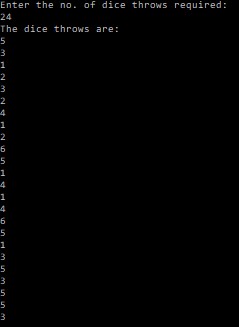Simuler un LANCEMENT DE DÉS – PROGRAMME C
Dans le dernier article, j'ai expliqué comment générer des nombres aléatoires dans une plage donnée :[min, max].
Dans cet article, nous utiliserons ce code pour simuler un lancer de dés.
Il suffirait de modifier légèrement le dernier programme, tel que min=1 et max=6, pour un dé.
CODE :
/***********************************************
*******************DICE THROW*******************
***********************************************/
#include<stdio.h>
#include<math.h>
/**Function that generates a random number.
Parameters:
r0: initial (first) seed
a: scale factor , so that a*r0 give the first random number
m: gives the max. value of random numbers that can be generated (m-1)
c: additional displacement(offset) factor
**/
int rand(int r0, int a, int m, int c){
int r1=(a*r0+c)%m;
return r1;
}
/**Function that generates random numbers in a given range: [min,max], given a seed r0, and stores them in an array that is passed as an argument.
Parameters:
r0: initial (first) seed
a: scale factor , so that a*r0 give the first random number
m: gives the max. value of random numbers that can be generated (m-1)
c: additional displacement factor
n: no. of random numbers to be generated
x[n]: array that will store the random numbers
min: lower limit for random nos.
max: upper limit for random nos.
**/
void randomNos(int r0, int a, int m, int c, int n, int x[n], int min, int max){
int r1=rand(r0,a,m,c);
int r2=min+((max-min+1)*r1)/m;
int i;
for(i=0;i<n;i++){
x[i]=r2;
r1=rand(r1,a,m,c);
r2=min+((max-min+1)*r1)/m;
}
}
main(){
int min=1, max=6, n; //For dice the range of random Nos. needed is 1-6
int a=1093, m=86436, c=18257, r0=43; //Constants for random number generation
printf("Enter the no. of dice throws required:\n");
scanf("%d",&n);
int random[n]; //array that stores the dice throw results
randomNos(r0, a, m, c, n, random, min, max);
int i;
printf("The dice throws are:\n");
for(i=0;i<n;i++){
printf("%d\n",random[i]);
}
}
SORTIE :
